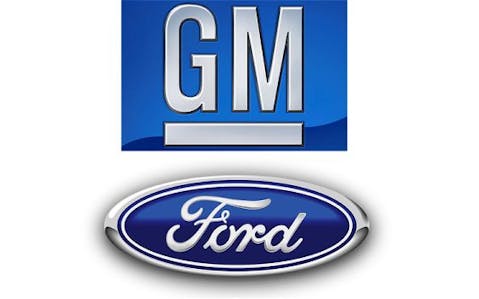No vehicle segment has more impact on Detroit’s Big Three automakers as the full-size pickup does. The good news for Ford Motor Company (NYSE:F), General Motors Company (NYSE:GM) and Chrysler is that they continue to watch their sales rebound from the depths of the recession. A rising tide raises all boats, and in this case we’re seeing a perfect storm of factors that look to keep pickup sales – and their respective automakers’ profits – very strong. I’ll cover those factors, and show you just how strong the sales came in for June.
Detroit dominance
If you break down last year’s numbers, Ford Motor Company (NYSE:F)’s F-Series was the leader in the full-size segment, owning 38.5% of the market with its crosstown rival General Motors Company (NYSE:GM) coming in at 35.5% (a combination of its Silverado and Sierra sales). Chrysler’s Ram came in third at a respectable 17.5%. That adds up to Detroit owning nearly 92% of the most profitable segment in the U.S. which produced our nation’s two top-selling vehicles – the F-Series and Silverado.
To put in perspective how important this segment is, let me remind you that full-size pickups are estimated to bring in as much as 60% of Detroit automakers’ profits. While the automakers are trying to lessen their dependence on the segment, they can enjoy the surge in sales for now. The good news is that there is still plenty of room for optimism and growth.

Information from Automotive News DataCenter. 2013 Projected by author from sales through June.
Using the first half of the year in sales to project the second half, we can see that Detroit looks to continue its rebound in sales. Ford Motor Company (NYSE:F) is outpacing the growth, yet that is something General Motors Company (NYSE:GM) hopes to change as sales of its redesigned 2014 Silverado strengthen.
In June, Ford Motor Company (NYSE:F)’s F-Series posted sales of 68,009 trucks, which was an impressive 23.6% gain over last year, and Ford Motor Company (NYSE:F) is up 22% for the year – remaining America’s best-selling truck and vehicle.
Last month, General Motors Company (NYSE:GM)’s Silverado sales increased 28.9% to hit 43,259 trucks sold, still trailing the F-Series by nearly 25,000 for June alone. The GMC Sierra also had a nice 32.8% increase over last June, recording 16,568 in sales.
Not wanting to be left behind, Chrysler’s Ram truck sales came in at 29,644, which was good for a 24% increase over last year. The Ram truck in year-to-date sales is also up 23% compared to last year. The Ram truck brand had the largest sales gain of any Chrysler brand and had its best June since 2007.
Shown in the graph below, transaction prices climb for full-size pickups much faster than the overall industry – driving big top-line revenue gains. This will have a huge positive impact when all Detroit automakers report quarterly earnings later this month.

Information source: Edmunds.com.
“Quite simply, it’s a great time to be in the truck business,” said Kurt McNeil, head of General Motors Company (NYSE:GM) sales operations in the United States, in a conference call last month.
McNeil is exactly right, and it only looks to improve going forward for a few reasons. The age of the average vehicle on the road remains at record highs of about 11 years, yet trucks are kept even longer, clocking in at about 13 years of age. This emphasizes that pent-up demand still exists and will continue to unleash as our economy gradually improves.
In addition to pent-up demand, an improving housing sector and ensuing construction rebound is bringing out contractors who had been waiting for more business before buying new work trucks. This has also been the case in North America’s recent energy boom in oil and natural gas – continuing strong demand in the full-size pickup segment.
As fuel efficiency and CAFE standards continue to increase, we’re seeing truck fuel-efficiency improve enough that the average user who doesn’t haul anything can buy a pickup for everyday driving.
Bottom line
June was the last month of sales for the second quarter. It looks to be a very impressive quarter for Detroit automakers’ revenues and profits, as long as losses in Europe were minimized and incentives were kept in check. Recently, Detroit autos have topped imports in incentives, but with transaction prices on the rise, that impact should be negated. We know one thing for sure: Revenues, margins, and profits should all be increasing on the drastic surge from the full-size pickup segment and the automotive industry rebound in general – something for every Detroit auto investor to be thrilled about.
The article Detroit Continues to Dominate Pickup Market originally appeared on Fool.com.
Fool contributor Daniel Miller owns shares of Ford and General Motors. The Motley Fool recommends Ford and General Motors. The Motley Fool owns shares of Ford.
Copyright © 1995 – 2013 The Motley Fool, LLC. All rights reserved. The Motley Fool has a disclosure policy.




